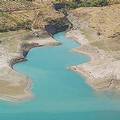 「中亞新聞報」(News Briefing Central Asia)一名觀察家指出,因應日漸增加的水資源需求,烏茲別克將會採納一份地區性協議,所有中亞國家將會分攤將河水引導至本國領土的費用。
「中亞新聞報」(News Briefing Central Asia)一名觀察家指出,因應日漸增加的水資源需求,烏茲別克將會採納一份地區性協議,所有中亞國家將會分攤將河水引導至本國領土的費用。
在10月10日歐亞經濟共同體領導人會議中,中亞各國元首達成協定,認為烏茲別克應該增加其對吉爾吉斯的天然氣供應,以及哈薩克應保證定期運送石油到吉爾吉斯。
這項協議預定2009年第一季開始生效,此安排使得吉爾吉斯能降低對於水力發電的依賴。這將會使得吉爾吉斯的水庫能儲存更多的水,以便在春夏季再將水釋出至河流中,此舉對烏茲別克和哈薩克農業灌溉計畫非常重要。
有80%中亞的水源是由吉爾吉斯和塔吉克的山區而來。雖然吉爾吉斯和塔吉克仍然負擔維護和調節水庫及其供水系統的費用,但其他國家從來沒有付過用水相關費用,且對這兩國所需的石油和天然氣採取越來越高的商業性收費。
在9月中旬,除了烏茲別克外所有的中亞國家達成口頭約定,以更互惠的方式使用水源,並且協調費用的分配。但是最後並未達成協議,這起因於烏茲別克多年來拒絕簽署互惠協定,並爭辯水是共通的資源,而且是無邊界限制的。
旅外的烏茲別克政治分析家約德謝夫(Tashpulat Yoldashev)相信,其他中亞國家將會迫使烏茲別克總統卡裡莫夫(Islam Karimov)簽署並實施協議,不然烏茲別克將在2009年秋天發現自己落入困境。
專家指出,不管是乾旱或低水位,任何灌溉水源的短缺,都會對烏茲別克經濟造成巨大的衝擊,因為這對農業造成極大的損害。水的短缺也將影響棉花,這項烏茲別克主要的出口物。
塔什幹一名經濟學者預測,在氣候變遷的影響下,對水的需求將會增加,再加上烏茲別克的人口持續增加,未來幾年情況會變得更為艱鉅。
其他的評論家也同意,在這些變化的情況下,塔什幹將會妥協接受其他中亞地區的提議,為所用的水付費。
「烏茲別克將要面對的現實是,水流僅穿越其領土,其發源地還是在邊境之外。」
Increasing demand for water is making it more likely that Uzbekistan will accept a regional arrangement where all the Central Asian states share in the costs of using the rivers that run through their territories, according to observers with News Briefing Central Asia.
At the October 10 meeting of heads of state of the Eurasian Economic Community, leaders of the Central Asian states reached agreement that Uzbekistan should increase its supply of natural gas to Kyrgyzstan, while Kazakstan will ensure the Kyrgyz receive regular deliveries of oil.
The arrangement will start operating in the first quarter of 2009, and is designed to reduce Kyrgyzstan's need to generate hydroelectricity.
This will allow it to store up more water in its reservoirs, which can then be let out over the spring and summer into the rivers which are crucial to Uzbek and Kazak agricultural irrigation schemes.
About 80 percent of Central Asia's water resources come from mountainous parts of Kyrgyzstan and Tajikistan.
Although the Tajiks and Kyrgyz also bear the costs of maintaining and regulating reservoirs and other water systems, the other states have not historically paid them for water, and charge them increasingly high commercial rates for oil and gas.
In mid-September, all Central Asian countries except Uzbekistan reached verbal accord on more mutually beneficial arrangements for water use, and negotiated the distribution of costs.
However, no final agreement was reached because of the Uzbeks, who have refused to sign a multilateral agreement for many years, arguing that water is a common asset for which borders are irrelevant. Tashpulat Yoldashev, an Uzbek political analyst now in emigration, believes the other Central Asian leaders will force Uzbek President Islam Karimov to sign and implement water agreements. If he fails to do so, Uzbekistan could find itself in difficulties by autumn 2009.
The experts note that any shortage of irrigation water - either through drought or low water levels - has a major impact on the Uzbek economy because of the damage done to agriculture.
Water shortages also affect cotton, a key export item for Uzbekistan.
One economist in Tashkent predicts that the situation is bound to get more difficult over the next few years as climate change leads to increased demand for water and Uzbekistan's population continues to grow.
Other commentators agree, saying that under these changing circumstances, Tashkent is going to have to compromise and accept proposals by other Central Asian states to pay its share for water.
"Uzbekistan is going to have to face the fact that the water only transits its territory, and the sources of that water are mainly outside its borders."
{This article originally appeared in News Briefing Central Asia, produced by the Institute for War and Peace Reporting}


